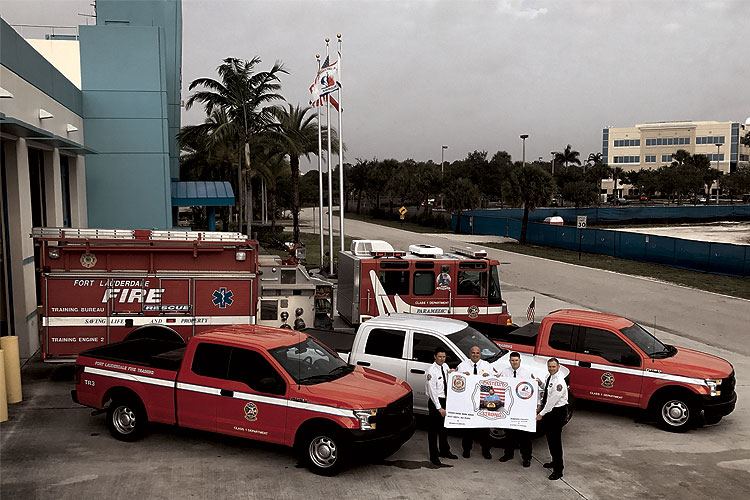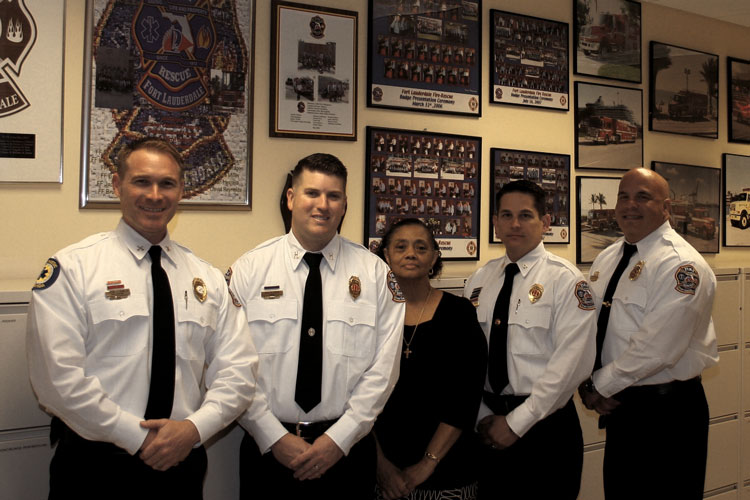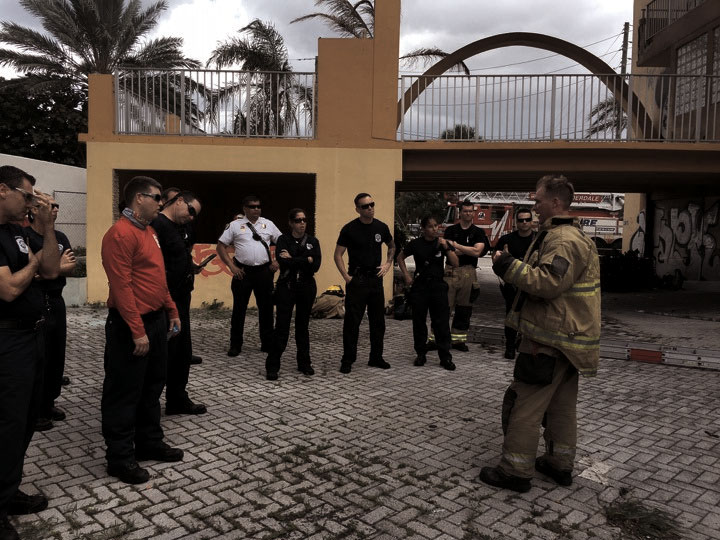
By Stephen F. Shaw, Jr.
“The greatest thing about being part of the training bureau is that we get to see the members of our department more than anyone else.” In my years with the Fort (FL) Lauderdale Fire Rescue Training & Special Operations Bureau, I have started every class with this same message. If you’ve had the most fortunate experience of working within your agency’s training division, you are aware of the amazing effect training can have on the skill level, aptitude, and morale within your agency. You also know the challenges – the crazy workload; the multiple classes you find yourself presenting; that feeling of never being able to “keep up,” the many classes you need to attend to stay fresh; and the constantly growing to-do list that never seems to have an end. Yet there is also arguably no greater vantage point from which to influence, communicate with, and create positive change within your department than in the training division – and that advantage is all at your fingertips every single day.
As with many paths in the fire service, taking on the role of the Training Chief is a crash course in prioritization, organization, and the realization that many of your lofty goals may have to take a back seat to all the various required moving parts within your department. Here are some tips that every new training chief should know.
RELATED: New Training Officer: Life in the Fast Lane | Interactive Scenario-Based Training | Passport to Train
1. Know your job!
Unless your department has a stellar succession plan in place (many do not), take the time to totally understand what your purpose is in the grand scheme of things. Set aside the time to educate yourself on your position every day. Schedule blocks of time specifically for this, and advise those around you know that you are doing this–this will help co-workers understand any delays on your part as you navigate new terrain.
Find your job description and read through it thoroughly. You’ll likely find items that may have been overlooked over time and responsibilities that have fallen by the wayside. Talk to your boss and determine what that person expects from you. Speak to the previous training chief to find out what worked and didn’t work and why Conduct a survey to find out what your department membership needs from its training bureau.
You will soon be expected to become the subject matter expert in all things training. When Ms. Smith calls 911, she doesn’t care if you have one day or 30 years in the profession–she has a problem, and she needs it solved. Same here. When someone calls and asks why they need to keep themselves certified when they retire, or says they will be deployed overseas when the next mandatory CPR class takes place, you are expected to know what to do. The time you take to establish your base will pay dividends throughout your tenure in training, as well as make you a resource to others who are in the same boat now or in the future.
2. Prioritize.
There are two categories here–what you have to do, and what you would LIKE to do. “Have-to” items keep everyone certified and keep everyone aligned with their respective job classifications. These are the non-negotiables. These often have laws, ordinances, contractual language, or regulations attached to them. All other items may be cut because of budget cuts, high call volume, whatever, but these items must be done. A common example is medical continuing education credits (CEUs) for EMTs and paramedics.
Make it your goal to understand these “have-to” items like the gospel. Become the subject-matter expert on all the things that make you train. The more you know about these items, the more you can start creating ways to delegate, automate, or in some way improve efficiency in these areas. You can then focus on all the other wonderful training topics you dream of on your off days.
The “like-to” things are the items you get to after the “have-to” things are on track. These are department specific, depending on your agency’s needs. For example, I have made it clear that my bureau will focus on relevant, quality hands-on training (acquired structures, live burns, etc.) What you may see as necessary and what your bosses think may differ quite drastically. You can spend time and energy dreaming up the most elaborate drills known to man, but if you let any of the “have-to” items slip, your bosses will eat your lunch, and you may be putting your members’ careers in jeopardy.
3. Start tracking everything you do.
You don’t realize it yet, but you will be a part of so many projects, drills, training seminars, initiatives and other career-shaping endeavors that you will forget what you have done over time. Seriously! Document everything you do. Journal your weeks in a binder. Start a blog. Whatever it takes. Make it a Friday tradition to take some time to record what you have done in whatever way you decide to track your progress and projects. Otherwise, you’ll need entire days to do it, and you may not have the time!
4. Data is king.
Long gone are the days where all you needed was a loud voice and a soapbox to stand on if you wanted something for your bureau. (If you are accredited or have a strong ISO ranking, you know this all too well.) Demanding that you need something without the data to back it up makes you look stupid. If you want something, put a plan together.
One of my training captains had worked in the private sector for years prior to the fire service. Although I thought we wouldn’t make much use of his worthless, non-fire related degree (he had his MBA), it turned out that we used his skill set every day. For example, we had prepared a business plan for the implementation of shift training captains to assist the bureau in increasing the number of hands-on training hours and presented it to my boss. I still remember the look on my boss’s face– I’m pretty sure he thought we were just going to come in with a bunch of notes hand-written in crayon. It was filled with statistics, charts, pie graphs, etc. The business plan helped get us what we needed, but this also became a double-edged sword. From this point on, this is what they expected from us–a complete and detailed project to justify what we needed in our bureau.
Our world is changing. Big Data. Quantitative Analysis. Analytics. Internet of Things (IoT). These are just some of the terms you hear in passing today but will become the norm tomorrow. Do not ignore where we are headed in this digital, data-driven world. Many online training platforms and learning management systems not only provide the ability to make training available to your entire department, but have the ability to gather and track data. This ability is invaluable, and much easier that making your own spreadsheets. Start taking some classes. Learn how to use Excel and to make dashboards and pivot tables. Make your data pretty! Embrace it, and get real friendly with those who know how to gather and analyze data.
5. How thick is your skin?
If you have not clearly defined the differences between being a friend and being a leader, this job ain’t for you. You will have to make tough decisions that will test long time friendships and the established loyalty of both your crews and your leaders.
These tough choices may mean the knives will come out, perhaps especially when your back is turned. Stand by your rules. If you require pre-course material prior to crews attending a class, and you have told them that they cannot attend and will be sent away if not done, and they do not show up with said material…follow through. As Teddy Roosevelt once said, “It is not the critic that counts.” You protect your department by the decisions you make. You safeguard the legacy that has been built for generations before you, and you set the tone for how it will be going forward. The moment you say, “Well, I’ll let this one thing pass, just this one time,” you have started down the slippery slope. Do the right thing. At the end of the day, be able to go home to your family and look them square in the eyes with pride and dignity, knowing you made moral and ethical decisions that were made to protect your department, your bureau, yourself, and your crews.
6. Network every day.
I could write a separate article on all the resources available to you as the training chief. The people you reach out to within your organization as well as those outside the fire rescue department, will be directly proportional to your success in your position. These resources could also be contacts that your co-workers need, and you can help make those connections. It could be something as simple as a public works engineer you once taught a CPR class to, who remembered your need for acquired structures and has access to some. Or perhaps your IT department having resources available after an upgrade that you could benefit from, and your meeting with them about your IT infrastructure needs has helped make your bureau a priority.
Develop your professional network. Join and get involved with fire service organizations. The International Association of Fire Chiefs (IAFC) and International Society of Fire Service Instructors (ISFSI) are just a couple of prominent agencies with great networking opportunities. State-specific agencies are another strong source for resources, such as the Florida Fire Chiefs Association (FFCA). Use LinkedIn and keep it professional–it ain’t FaceBook. Don’t be that person who tries too hard and makes it a joke. Remember to be a resource for them as well. If they call, don’t forget to call them back. The bridges you build now may carry you, your department, and your initiatives on to the next level
7. Take care of your staff.
The cohesiveness of your staff will make or break you. You need to set clear goals and objectives, hold them accountable, and ensure they have all the tools they need to do their jobs. But after all the basic needs are met, do everything in your power to make sure they know you value them. Meet with each member and determine what drives them. You can even go as far as to have your staff take personality tests (Meyers-Briggs, etc.) to obtain a deeper understanding of your staff. Whatever you do, find out what makes them tick and support them in multiple ways. Regarding rewards or recognition, each person has different needs. Some simply want a thank you or a pat on the back. Others like to hang department-awarded certificates on the wall. Some just want a photo to hang up on or to include inside a shadowbox. Find out what makes them tick!
Simple suggestions include finding out birthdays and put those dates in your phone or calendar as reminders. Find out how they take their coffee. What are their hobbies? What stressors are affecting them? You get the drift.

8. Get outside. Be seen. Don’t grow roots.
When you start in your new position, your reputation will precede you. The position of training chief is one of high honor. Don’t forget that, and do not rest on your laurels. Constantly seek to become better. If you schedule a class that your trainers are teaching, attend one of those classes. If your crew is teaching a series of classes, give them a break from time to time and teach. Attend conferences and seminars as a student. Show yourself an interested, constant student of the fire service!

You’re always going to be too busy, and there’s always going to be more to do. You’re never going to catch up. If you ever find yourself wondering, “What’s that guy’s name again?” then you’ve lost touch. Get out of your office and get back in the game!!!
9. You have the greatest platform in the fire service for communication.
The fact that you will see everyone in your department over a short timeframe gives you and your training bureau the greatest advantage when it comes to communication. How many times have you heard some random stab at how terrible the current state of communication is?
Your students must come to class. They must get recertified, and must see you at some time for something related to training. This is a gift, and an opportunity of massive proportions. You have the power to communicate to everyone regardless of the chain of command. I’m not saying this so you go rogue and spread “fake news.” Rather, you can fill gaps. You can verify or negate rumors. Use this advantage wisely!
10. “Constant gentle pressure…”
Our late medical director for Fort Lauderdale Fire Rescue used to always say: “Nothing worth it is easy, and no one is going to do your job for you.” No one is going to spearhead the projects you know your agency desperately needs unless you do it. But sometimes the timing is off, the right political environment is not there, someone up top isn’t your best friend, whatever. In some cases, the right people are not in the right places and the support you need to accomplish your vision may not materialize. But you must persevere.
Stay the course, because good things really do take time. Our profession needs fighters, leaders in education, and “training evangelists.” Your crews need to see you rise after getting knocked down. They need to see leaders who will fight, and not throw in the towel when times get tough. It may sound easy to say, but don’t let the negativity of others or the weight of your agency’s red tape block your initiative and drive. I remember being told early on that “they” (management) would eventually wipe that smile from my face. Four years into my position in training, and I am proud to say I’m still smiling!
The position of training chief is one of prestige, but that title comes with massive responsibilities. You arguably have more potential to change the hearts and minds of the firefighters within your organization than anyone else. The fire service needs strong progressive training bureaus to meet our collective needs, and there is rarely a break, but know that your hard work supports and protects generations of firefighters.
Stephen Shaw has spent 18 of his 22 years in the fire service with Fort Lauderdale (FL) Fire Rescue and serves as battalion chief of Training & Special Operations. He is an accredited Chief Training Officer and the chair of the Training & Education Subcommittee of the Fire Chiefs Association of Broward County. He is a Hazmat Specialist with USAR FL-TF2 and the Training Task Force chair of the South Florida Local Emergency Planning Committee.

